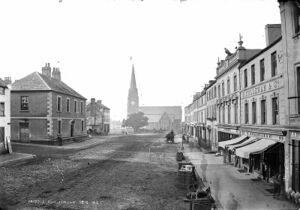Kingdom of New Ulaidh
History
State established
On December 6, 2022, Amir Gwaj founded a new state called New Ulaidh. Amir created the state because he believed that his country's government was controlled by the New World Order. He wanted to create a state where people could feel safe and confident in their government, one that was transparent and would not be controlled by an evil organization. Amir chose New Ulaidh because it means Ulster in english, this is the place where the King was born. He believed the New World Order were ‘enslaving’ Earth's population. New Ulaidh proclaimed independence from the United Kingdom on the same day.
Geography and climate

Lurgan is a town in north Armagh, Northern Ireland. The two main formations in north Armagh are an area of estuarine clays by the shore of Lough Neagh and a mass of basalt farther back. The earliest human settlements in the area were to the northwest of the present day town near the shore of Lough Neagh. When land was handed to the Brownlow family, they initially settled near the lough at Annaloist but later settled where the town was eventually built. Today, the oldest part of Lurgan is its main street, which is built on a long ridge in Lurgan townland (baile fearainn). A neighbouring hill is home to Brownlow House, which overlooks Lurgan Park.
Lurgan's climate is like that of inland areas in Ireland. In summer, temperatures can reach the mid-20s °C (mid-80s °F), and it is rare for them to go higher than 30 °C (86 °F). The humidity in Ireland—which is common throughout the country—can make temperatures feel uncomfortable when they stray into the high 20s °C (80–85 °F), more so than similar temperatures in hotter climates in the rest of Europe.
| Climate data for Lurgan | |||||||||||||
|---|---|---|---|---|---|---|---|---|---|---|---|---|---|
| Month | Jan | Feb | Mar | Apr | May | Jun | Jul | Aug | Sep | Oct | Nov | Dec | Year |
| Average high °C (°F) | 7 (45) |
8 (46) |
10 (50) |
12 (54) |
15 (59) |
17 (63) |
19 (66) |
19 (66) |
16 (61) |
13 (55) |
10 (50) |
7 (45) |
12.8 (55) |
| Average low °C (°F) | 2 (36) |
2 (36) |
3 (37) |
4 (39) |
6 (43) |
9 (48) |
11 (52) |
10 (50) |
9 (48) |
7 (45) |
4 (39) |
3 (37) |
5.8 (42.5) |
| Average Precipitation cm (inches) | 5.6 (2.2) |
4.67 (1.839) |
4.46 (1.756) |
4.62 (1.819) |
4.22 (1.661) |
4.38 (1.724) |
4.49 (1.768) |
4.84 (1.906) |
4.58 (1.803) |
6.79 (2.673) |
5.94 (2.339) |
5.61 (2.209) |
60.2 (23.7) |
| Source: MSN.com | |||||||||||||
Government and politics
The Kingdom of New Ulaidh is a unitary parliamentary constitutional monarchy. The Monarch, who is the head of state, signs pieces of legislation into law and appoints public officials on the advice of the government. The Prime Minister leads the government, which consists of several ministries led by ministers. That group makes up the executive branch, which is responsible for carrying out the laws and policies passed by the legislature. The National Assembly is the unicameral legislature, which reviews and votes upon pieces of legislation referred to it by the monarch or a minister. The legislature has seven seats in total.
Military
As of 2022, the armed forces of New Ulaidh were composed of less than 10 soldiers. They have 0 military equipment and 0 vehicles. The armed forces will expect to own 1 Centurion Mk 12 tank and/or a Russian T-54 tank.
Culture
The culture of Ulaidh is primarily Polish-centric and British, with high emphasis on the Polish language in regards to resident citizens. Catholicism also plays a large role, with Catholics making up a majority of citizens. The Bigos is Lass los's national food, with its origins in Poland, where the originator was born. The dish is a stew that serves as a hot appetiser. It contains a variety of meats, sauerkraut, and cabbage. The meats are sliced into small parts, then Sauerkraut and shredded fresh white cabbage are mixed in. The meal does not degrade rapidly, and each reheating improves its flavour. Bigos may be derived from the mediaeval dish compositum, which means "mixing" in Latin.